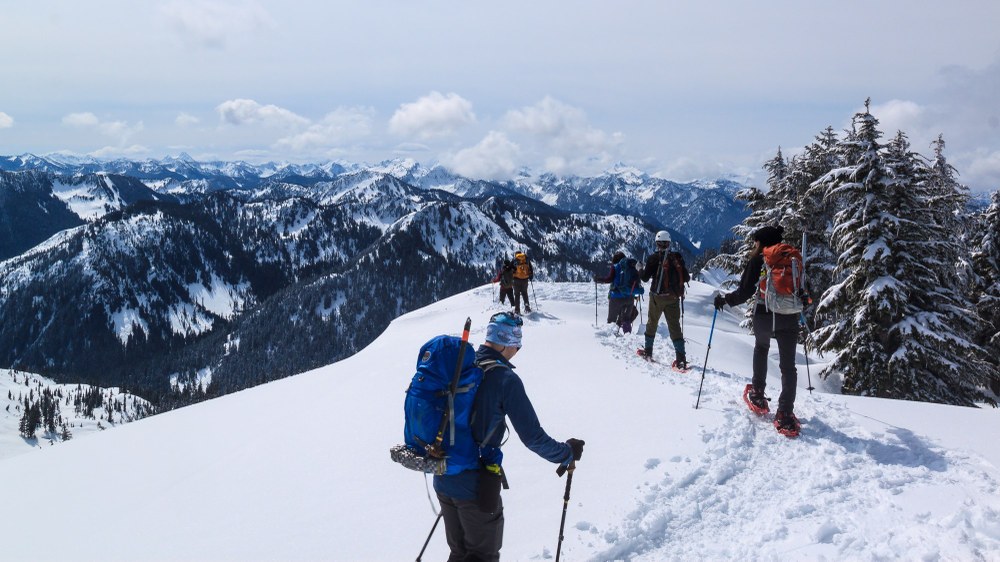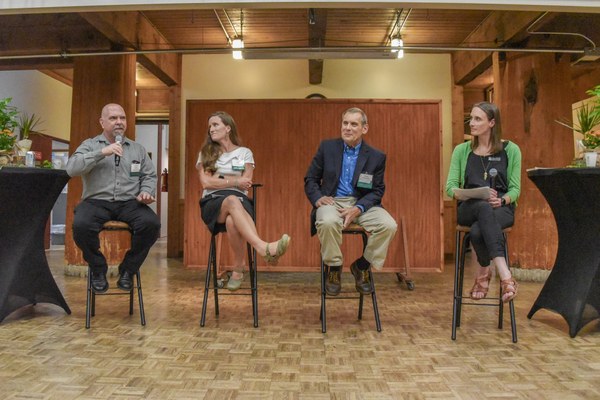
In July 2021, my wife and I navigated high-season crowds to Colchuck Lake on our first adventure in the Alpine Lakes Wilderness, one of the most visited Wilderness Areas in the country. We arrived early and still had to park a mile from the trailhead. During the hike, we passed by throngs of other outdoor enthusiasts. Experiencing this bustle didn’t diminish the stunning views and thrill of wide-open spaces, but it did underscore the need to harmonize recreation with the protection of this beloved landscape.
We’re all feeling it: our parks and trails are more crowded than ever. More people in our region are discovering time outdoors to be essential to personal health, well-being, and building community. At The Mountaineers, we believe everyone should be able to find joy and belonging outdoors while ensuring the natural world is protected for generations to come.
Blazing a trail with wise conservation
Conserving nature while sustaining inclusive outdoor access has always been at the heart of The Mountaineers ethos, sometimes requiring a delicate dance as we’ve carried out our mission and expanded our impact over the years. Our books and programs are intended to get more people outdoors while inspiring them to speak up to protect our beloved outdoor spaces. "If the wilderness is to be protected, it must have more defenders,” reflected influential Mountaineers leaders and authors Harvey Manning and Ira Spring, “people who know it intimately and love it well.”
Throughout our 117-year history, The Mountaineers has always advocated at the intersection of conservation and outdoor access. Our conservation and recreation goals are reciprocal, as access to wild places motivates recreationists to advocate for and steward the natural world. Balancing these focuses of our mission has played out differently as new issues have arisen throughout the years and we’ve learned more about effective conservation practices.
Standing at the intersection of conservation and outdoor access has become increasingly challenging. Public lands and waters throughout the country are facing a unique suite of challenges that impact recreation and conservation. Climate change, lack of funding for land managers, impacts of increased recreational use, and the need to prioritize protecting Tribal treaty rights, cultural resources, and lifeways are raising tough questions with no easy answers.
How do we equitably manage increased visitation to public lands? How do we best protect natural and cultural resources and respect tribal sovereignty?
 Speaker panel from The Mountaineers 2023 An Evening of Advocacy event at Daybreak Star Indian Cultural Center in Seattle. Photo by Kara Hollenbeck.
Speaker panel from The Mountaineers 2023 An Evening of Advocacy event at Daybreak Star Indian Cultural Center in Seattle. Photo by Kara Hollenbeck.
Striking a balance on Washington’s public lands today
The Mountaineers is committed to centering outdoor equity as we leverage the voices of Washington's human-powered recreationists to help meet these challenges by engaging in collaborative efforts that balance conservation and outdoor access. Here are some of the issues that are top of mind for our outdoor access work, and where your feedback is helping shape a better future for Washington’s outdoors.
Managing visitor use on Mt. Rainier
As more people experience the beauty of Mt. Rainier, it becomes harder for the Park to provide a quality visitor experience and protect natural and cultural resources. “At a time of significant growth in visitation to Mount Rainier National Park, staff have fewer resources to manage recreational use,” shared Deputy Superintendent, Kevin Skerl. “Over the last 15 years, we’ve seen a 40 percent increase in visitation, while operating budgets have declined, and staffing levels have dropped.”
The Park is exploring ways to disperse use and better conserve resources using a full array of management tools and strategies. This spring, we shared the Park’s proposal to manage use by implementing a timed-entry reservation system during peak visitation. We understand the need to more tightly manage visitation and conserve resources, but have concerns with several aspects of the proposed management plan.
We submitted comment letters in 2020, 2021, and 2023, and our members shared feedback directly with Park staff. We heard loud and clear about how these changes would affect our members’ experience. We’re continuing to engage with Park leadership as they finalize their management plan, and will share more about what future access looks like and how you can continue to experience the mountain you cherish.
Backcountry boom in the Alpine Lakes
The beauty and rewarding backcountry experiences offered by the Alpine Lakes Wilderness have inspired Mountaineers for generations. With more people visiting than ever, the Forest Service needs additional resources and new methods for managing the Wilderness.
Our conservation team is heavily involved in the Alpine Lakes Collaborative - a community-centered project aimed at creating a sustainable, modern method for managing visitor use that preserves wilderness character, recreational access, and equity. We’re in the early stages of this process, and the collaborative is keeping an open mind about what future tools and strategies might be needed to preserve the Alpine Lakes’ wilderness character.
This summer, our members provided feedback to help inform the collaborative’s work. We look forward to sharing future opportunities to engage with and amplify recreation perspectives as we chart a course toward a more sustainable future for the Alpine Lakes Wilderness and the amazing outdoor experiences it provides.
Convening diverse perspectives to tackle tough issues
One of the ways we’ve recently engaged members to advance these important discussions was by convening a panel of public land managers, recreationists, and conservation advocates at this fall’s An Evening of Advocacy conservation fundraiser. The panel shared thoughts on the need to equitably manage a changing landscape, the responsibility we all have to care for our outdoor spaces, and the role we play in these efforts.
“When individuals take responsibility for something, they’ll care for it,” shared Mountaineers Books author Craig Romano. “Recreationists can help address these tough challenges by first elevating their stewardship of our public lands.”
The conversation was bolstered by thoughtful questions from the audience, underscoring how Mountaineers experience these challenges and are empowered to shape solutions. “As we continue to connect communities to nature and build new champions for the outdoors to move policy, it’s important to ask ourselves how we can make outdoor access and parks issues the personal agenda of more recreationists,” said Kitty Craig, Urban to Wild Director at the Wilderness Society.
Preserving a sustainable future together
As The Mountaineers continues to convene partners, tackle tough issues, and work toward solutions, your engagement is essential to shaping a sustainable future for the Northwest’s special landscapes. At the heart of this discussion are your personal stories that underscore how these challenges impact your outdoor experiences and connection to nature.
Connection to the natural world can translate to compelling advocacy with lawmakers and land managers so that future generations can access transformative outdoor experiences on public lands and waters. We’ll continue to share how you can advocate for the protection of these resources while also preserving sustainable and equitable outdoor access. Stay updated on policy and planning efforts that affect Washington’s outdoors through our conservation newsletter, and share your story when opportunities arise.
If Mountaineers continue to speak up, we can build a better future for Mt. Rainier, the Alpine Lakes, and the rest of our region’s iconic public lands that provide a lifetime of adventure with purpose.
We want to hear your thoughts on how we can continue to balance conservation and outdoor access. Email conservation@mountaineers.org with your thoughts, questions, or concerns.
This article originally appeared in our winter 2024 issue of Mountaineer magazine. To view the original article in magazine form and read more stories from our publication, visit our magazine archive.
 Conor Marshall
Conor Marshall